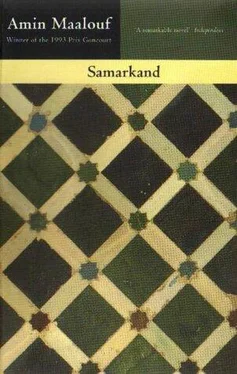Thus in Samarkand they were celebrating being spared from war. The immense square of Ras al-Tak was overflowing with smoke and noise. Itinerant merchants had erected stalls against every wall, and under every street lamp there was a singing girl or a lute player improvising melodies. Myriad groups were forming and dispersing around the story-tellers, the palm-readers and the snake-charmers. In the centre of the square, on a hastily constructed and shaky rostrum they were holding the traditional contest amongst popular poets who sang praise to the incomparability and invincibility of Samarkand. The public’s judgement was instant. New stars arose and others waned. There were wood fires almost everywhere, as it was December and the nights had already turned cold. In the palace, jars of wine were being emptied and smashed. The Khan was jovial, boisterous and swaggering with drink.
The next day he had the prayer for the dead recited in the great mosque and then received condolences over the death of his father-in-law. The same people who had rushed over the day before to congratulate him on his victory came back, wearing expressions of mourning to express their sorrow. The qadi , who had recited some appropriate verses and invited Omar to do the same, gave Omar an aside:
‘Do not be astonished at anything. Reality has two faces and so do people.’
That very evening, Abu Taher was summoned by Nasr Khan, who asked him to join the delegation charged with going to pay Samarkand’s homage to the deceased Sultan. Omar had set off too, albeit with a hundred and twenty other people.
The site of the condolences was an old Seljuk army camp, situated just north of the river. Thousands of tents and yurts were pitched all around, a veritable improvised city where the solemn representatives of Transoxania rubbed shoulders distrustingly with the nomad warriors with long plaited hair who had come to renew their clan’s allegiance. Malikshah, at seventeen, a giant with the face of a child, was wrapped in a flowing karakul coat and sat enthroned on the very dais where his father, Alp Arslan, had fallen. Several steps in front of him stood the Grand Vizir, at fifty-five years old the strongman of the empire, whom Malikshah called ‘father’ as a sign of extreme deference. Nizam al-Mulk, the Order of the Kingdom. Never had a name been more deserved. Every time a visitor of rank approached, the young sultan gave the Vizir a questioning look. He then gave an imperceptible signal as to whether to receive the visitor warmly or reservedly, serenely or distrustingly, attentively or absently.
The whole delegation from Samarkand prostrated themselves at the feet of Malikshah who acknowledged them with a condescending nod of the head. Then a number of the notables left the group to make their way toward Nizam. The Vizir was impassive. His colleagues were bustling around him but he looked at them and listened to them without reacting. He should not be thought of as a master of the palace who shouted out his orders. If his influence was ubiquitous, it was because he worked like a puppeteer, who with a discreet touch impressed on others the movements which he desired. His silences were proverbial. It was not rare for a visitor to spend an hour in his presence without any words being exchanged other than the phrases of greeting and parting. He was not visited for his conversation, but so that allegiances could be renewed, suspicions dispelled and oblivion avoided.
Twelve people from the Samarkand delegation had obtained the privilege of shaking the hand which held the rudder of the empire. Omar followed close behind the qadi Abu Taher who muttered a formula. Nizam nodded and kept his hand in the qadi’s for a few seconds, thereby honouring him. When it was Omar’s turn, the Vizir leant over to his ear and murmured:
‘On this day next year, be at Isfahan and we shall speak.’
Khayyam was not certain that he had heard correctly and he felt a little off-balance. The personage intimidated him, the ceremonies impressed him, the chaos intoxicated him and the wails of the mourners were deafening him. He could no longer trust his senses. He wanted some confirmation that he had heard correctly but he was already being swept along by the flow of people. The Vizir was looking elsewhere and had started to nod his head in silence again.
On his way back, Khayyam could not stop mulling over the incident. Was he the only one to whom the Vizir had uttered those words? Had he not confused him for someone else, and why was the meeting so distant, both in terms of time and space?
He decided to take the matter up with the qadi . Since he had been just in front of him, he must have heard, felt, seen or guessed something. Abu Taher let him recount the scene, before admitting mischievously:
‘I noticed that the Vizir whispered some words to you. I did not hear them, but I can assure you that he did not mistake you for anyone else. Did you see all the people around him. Their job is to obtain information on the composition of each delegation and to whisper him the name and position of those approaching him. They asked me your name, assured themselves that you were the Khayyam of Nishapur, the intellectual and the astrologer. There was no confusion over your identity. Anyway, the only confusion with Nizam al-Mulk is that which he deems fit to create.’
The way was flat and stony. To the right in the distance lay a line of high mountains, the foothills of Pamir. Khayyam and Abu Taher rode along side by side with their mounts brushing against each other.
‘What can he want of me?’
‘In order to find out, you will have to wait a year. Until that time, I advise you not to bog yourself down in conjecture. The wait is too long and you will exhaust yourself. Above all, do not mention this to a soul!’
‘Do I usually prattle?’
The tone was that of reproach, but the qadi did not allow himself to be flustered:
‘I wish to be clear: do not mention this to that woman!’
Omar should have suspected that Jahan’s repeated visits could not have gone unnoticed. Abu Taher continued:
‘At your first meeting the guards came to inform me. I concocted a complicated story to justify her visits. I ordered them not to see her and forbade them to wake you up every morning. Have not the slightest doubt, that pavilion is your house, I want you to know that today and tomorrow. However, I have to speak to you about that woman.’
Omar was embarrassed. He did not appreciate at all the way his friend said ‘that woman’ and he had no desire to discuss his affairs. Although he was saying nothing to his elder, his face tightened.
‘I know that what I am saying vexes you, but I shall go on saying it until I have said it all, and if our too-recent friendship does not give me the right, my age and position do. When you saw that woman for the first time in the palace you looked upon her with desire. She is young and beautiful and you liked her poetry and her audaciousness warmed your blood. However you had differing attitudes towards the gold. She stuffed her mouth with what disgusted you. She behaved like a court poetess and you acted as a sage. Have you spoken to her about it since then?’
The reply was no, and, even though Omar said nothing, Abu Taher heard it clearly. He continued:
‘Often, at the beginning of an affair, the sensitive questions are avoided. There is a fear of destroying this fragile edifice which has just been erected with a thousand precautions, but as far as I am concerned what sets you apart from this woman is both serious and fundamental. You do not look at life the same way.’
‘She is a woman and, what is more, a widow. She is trying to fend for herself without depending on a master, and I can only admire her courage. And how can one reproach her for taking the gold which her verses are worth?’
Читать дальше












